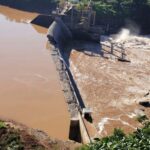The book in PDF Form with title Geology for Civil Engineers By A.C. McLean C.D. Gribble of University of Glasgow Second Edition is a famous book with introductory and in depth knowledge of geology which every civil engineer must know.
Today I am going to share a review as well as the download links to you that I have found on the internet.

Most civil engineering projects involve some excavation of soils and rocks, or involve loading the Earth by building on it. In some cases, the excavated rocks may be used as constructional material, and in others, rocks may form a major part of the finished product, such as a motorway cutting or the site for a reservoir.
- Read : Civil Engineering Subjects
The feasibility, the planning and design, the construction and costing, and the safety of a project may depend critically on the geological conditions where the construction will take place. This is especially the case in extended ‘greenfield’ sites, where the area affected by the project stretches for kilometers, across comparatively undeveloped ground.
Download Link is at the end of the article
Like Us on Facebook!
- Read : About Soil Engineering
Subscribe Us on YouTube!
Examples include the Channel Tunnel project and the construction of motorways.
In a section of the M9 motorway linking Edinburgh and Stirling that crosses abandoned oil-shale workings, realignment of the road, on the advice of government geologists, led to a substantial saving.
In modest projects or in those involving the redevelopment of a limited site, the demands on the geological knowledge of the engineer or the need for geological advice will be less, but are never negligible. Site investigation by boring and by testing samples may be an adequate preliminary to construction in such cases.
Author of the Book
A.C. McLean C.D. Gribble Second Edition
Title of the Book
Geology for Civil Engineers PDF Download for Free
Preface of the Book
The impulse to write this book stemmed from a course of geology given by us to engineering undergraduates at the University of Glasgow. The course has changed, and we hope improved, during the twenty years since one of us was first involved with it. It was essentially a scaled-down version of an introductory course to science undergraduates; it is now radically different both in content and in the mode of teaching it.
Our main thought, as we gradually reshaped it, was to meet the special interests and professional needs of budding civil engineers. It is a matter for serious debate as to whether time should be found within an engineering course for classes of a broad cultural nature. Our experience in teaching indicates that the relevance of subject matter to the vocation of those taught usually increases their interest and enthusiasm.
Furthermore, in engineering curricula which are being crowded by new and professionally useful topics, we doubt whether a place would have been found for a general course on geology which discussed, for example, the evolution of the vertebrates or the genetic relationship of the various basic plutonic rocks. On the other side of the scale, we have firm beliefs that educated men and women should be aware of the Theory of Natural Selection and its support from the fossil record, and should be aware of other major scientific concepts such as plate tectonics.
We have found some space for both of these in our book. Other apparent digressions from what is obviously relevant may serve a professional purpose. For example, civil engineers must have an insight into how geologists reach conclusions in making a geological map, in order to evaluate the finished map. Similarly, they should appreciate how and why geologists differentiate between (say) gabbro and diorite, not because these differences are important for most engineering purposes but so that they can read a geological report sensibly and with the ability to sift the relevant from the irrelevant information.
Our course and this book are essentially an introduction to geology for civil engineers, which is adequate for the needs of their later careers, and on which further courses of engineering geology, soil mechanics or rock mechanics can be based.
They are not conceived as a course and text on engineering geology. We have, however, extended the scope of the book beyond what is geology in the strict sense to include engineering applications of geology. This is partly to demonstrate the relevance of geology to engineering, and partly in the expectation that the book, with its appendices, will also serve as a useful handbook of facts and methods for qualified engineers and other professionals who use geology.
The reactions of the majority of those who reviewed our first draft reassured us that our ideas were not peculiar to ourselves, and that we were not the zvx only teachers of geology who felt the need for a textbook tailored to them. Other views ranged from a preference for altering the book to make it a comprehensive account of the whole of geology largely devoid of material on engineering, to a preference for a more radical change along the lines we were following, which would have produced an introductory text in engineering geology rather than geology.
The balance of opinion seemed reasonably close to our own prescription, though we are grateful for the many constructive suggestions that have led to major changes of content and arrangement as well as minor amendments. If we have not ended at the centre of the many opinions that colleagues and friends have kindly given us, it is because at the end of the day we have special interests and views ourselves, and it is our book. We hope that you will find it useful and readable.
Contents of the Book
- Introduction
- Minerals and Rocks
- Superficial Deposits
- Distribution of rocks at and below the surface
- Subsurface (Ground) water
- Geological exploration of an engineering site
- Rocks and Civil Engineering
- Principal Geological factors affecting certain engineering projects.
Download the Book for free
The Book on Geology for Civil Engineers is available in pdf form of 9 mb size. You can download the book by becoming our free Member at our portal. Just click the download now button below and you will be taken to our portal for either signup for free membership or login to your already active membership. Please use valid email id for signing up as the system will validate your email id. The process is fully automated once your membership got activated your premium fast download link will be unlocked and you can download the book in seconds.
Disclaimer : The title of the book \”Geology for Civil Engineers in pdf\” and its contents is copyrighted content of the publisher. We here at iamcivilengineer is just sharing different links that are available on the internet. If you have any problem with the link or want to remove the link for copyright issues you can simple hit an email to info@iamcivilengineer[dot]com and the link will be removed immediately. We are just sharing the content for poor students who can\’t afford to buy the book. With downloading the book you agree to follow our terms of use and terms of service.
















nice work bro
nice work bro